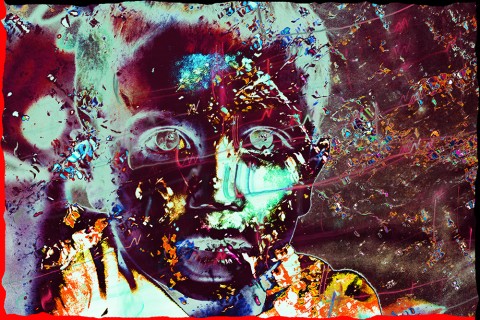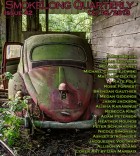I’m thinking of Virginia Woolf, and of her ice-skating Orlando, while I wait in the winter morning at the bus stop. I’m on my way to work.
I’ve stopped eating these past three days, so no breakfast. We used to sit together, me and you, in front of the television, stuffing our faces with toast from trays on our knees, but no more.
This morning I have the traffic, and my thoughts, and you have your new man. The Beatles are singing “Helter Skelter” in my head, and at the climax of the song I know it’s Paul who shouts about the blisters on his fingers, not John. On this—as on too many things—we disagreed.
It’s three years since I read Woolf’s novel, and the only thing I remember is Orlando ice-skating on the Thames. A unique work of art, reduced in my mind to one vague and uncertain recollection (was it Orlando who skated, or her beau?) so is it any wonder that already—three bright days and three dead nights—my memories of our time together are becoming mangled and deceiving?
Even the photographs are fictions, and in any case, I’ve kept none. I’m reminded of the child I saw who fell while paddling in a fountain—who slipped and cracked his head so hard I heard the sharpness of it twenty feet away—and at that very moment his mother was taking a photograph of him. Did I tell you about this? Did you listen? Or care? What became of that photograph, I wonder? Or, rather, I don’t wonder at all. The mother would have deleted it, I’m certain. Who would want a photograph of something like that?
There’s one I recall of you standing on the very precipice of a volcano’s crater, and I don’t need to see it to remember that you stumbled just after it was taken, and I reached desperately for your hand. Instinct, of course. Not love.
Other photographs, too, I remember. The one where you turned your head—a car on the road to your right had just ploughed into another with a crunch—and your face in the resulting image seems to be melting away. If I were to keep a photograph of you then that would be the one.
There’s a boy here now, on his own, staring into a puddle, and I imagine in him the son we never had, or the childhood I can only remember in shards: a safe house in darkness, and me wide awake inside of it; a country holiday filled with fat sheep and handstands; courting couples everywhere, holding hands on a summertime beach; a girl with a big, fat face, and me with a felt-tip pen, plotting tiny orange dots on her cheeks then joining them so that in the mirror she could decipher my message of love; a swimming pool, a soft, bright morning, a splash. And all the while, Potential, capitalised and writ bright, in blue neon.
I’m standing at this bus stop, it’s not quite seven a.m. and I’m tired, hungry and cold, so forgive me my reminiscences.
Kings, and beautiful women, and the faces of the dead. These are the things I wish to write about. But, failing that, then: how we broke up; how you left me; how you have found someone new.
A man wearing nothing but a t-shirt, his hair cut into some kind of a triangle, is here now. Also, a leaning woman with closed eyes who seems—for all the world—dead. And, of course, puddle-boy. We’re a veritable crowd. I picture that volcano, all of us toppling in, and I know that these others would not thank me for my imaginings. The politics of queuing demand that a veil of silence is draped over such thoughts, but still, I sigh. It’s loud enough for the leaner to open her eyes, for the triangle-haired, t-shirted man to turn to me with a frown, while Puddle-boy has metaphorically drowned.
I wonder, in this moment of difficult silence, if you are still in what used to be our bed, and whether your new man is in there with you.
But now, incredibly, another ice-skater! The advertisement on the side of the bus—for here it comes—features a young, smiling, androgynous figure, a twenty-first century Orlando selling fizzy drinks and brought here by coincidence to save me!
I climb aboard—first in the queue—and I sit next to an ugly woman who I know vaguely from the office. She turns to me, points to a story in her newspaper, and begins to tell me excitedly of the horse which carried its dead rider home. A heart attack, apparently, and a distance of over twenty-five miles.
“Would you ever believe it?” she says.
And I smile, because for a moment, looking into her morning eyes, I almost do.



 The core workshop of SmokeLong Fitness is all in writing, so you can take part from anywhere at anytime. We are excited about creating a supportive, consistent and structured environment for flash writers to work on their craft in a community. We are thrilled and proud to say that our workshop participants have won, placed, or been listed in every major flash competition. Community works.
The core workshop of SmokeLong Fitness is all in writing, so you can take part from anywhere at anytime. We are excited about creating a supportive, consistent and structured environment for flash writers to work on their craft in a community. We are thrilled and proud to say that our workshop participants have won, placed, or been listed in every major flash competition. Community works.